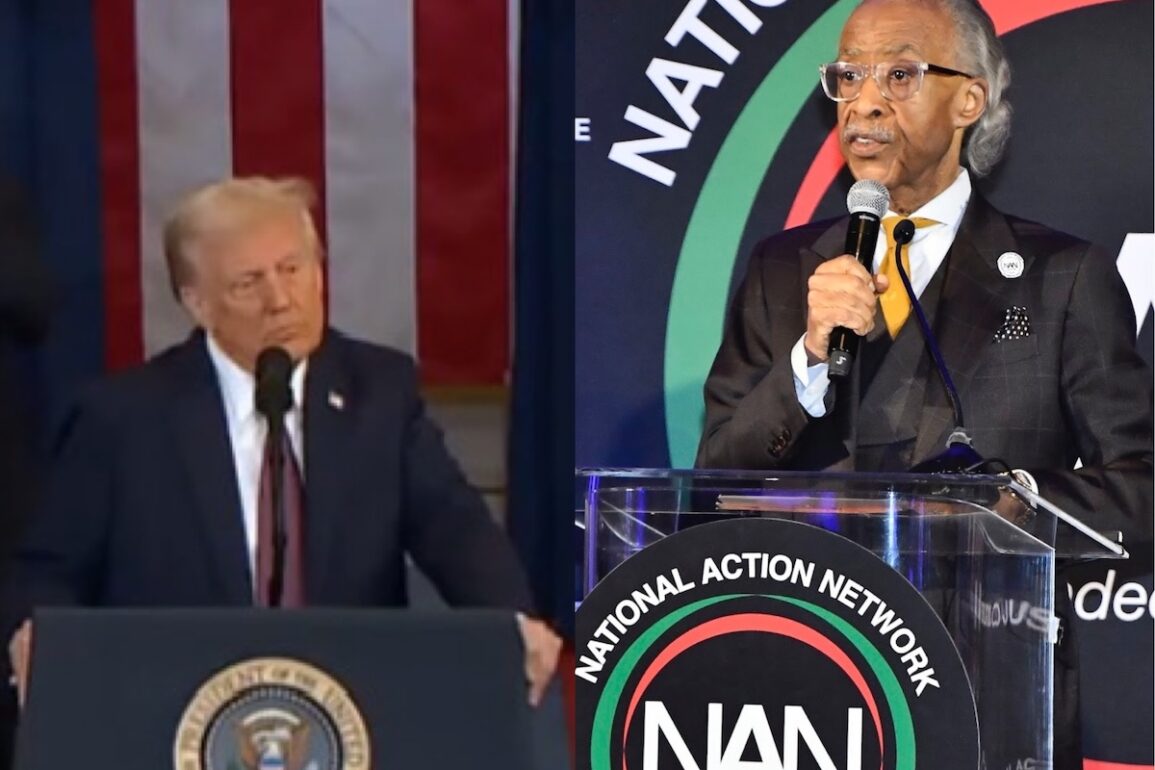
A little after noon on Monday, the same day celebrating the life of the Rev. Dr. Martin Luther King Jr., Donald Trump was sworn in as the 47th president of the United States.
As the nation commemorated the fallen civil rights leaders, Trump unveiled his America First priorities, which include measures that have citizens and activists concerned about what his plans mean for the future.
“Donald Trump just said in his inaugural address that he is going to end DEI (diversity, equity and inclusion) this week — he’s going to put out his executive order — [snd] you have these corporations that have said they’re going to back up off DEI. And why do we have DEI, because you denied us equity, you denied us inclusion,” the Rev. Al Sharpton said at the National Action Network (NAN) rally held at Metropolitan A.ME. Church in Northwest D.C. “DEI was a remedy to the racial institutional bigotry practiced in academia and in these corporations.”
NAN, founded by Sharpton, intentionally hosted the rally fighting against Trump’s policies and commemorating King’s legacy, mere miles away from the inauguration proceedings at the U.S. Capitol and around the same time of the swearing-in.
Sharpton emphasized embracing lessons from King in order to resist racism.
While Trump’s America First addresses: border security, economic policies, government restructuring, and social values, aiming to bolster what the administration calls “American values and safety,” the plans carry profound implications for Black Americans and other marginalized communities.
“Now you want to put us back in the back of the bus,” Sharpton said of the reversed DEI policies and Trump’s other proposals. “We’re going to do the Dr. King, Rosa Parks on you. We’re going to call you out one by one and we will shut you down.”
Although advocates argue his policies go against the civil rights leader’s legacy, Trump did take a brief moment to acknowledge the King holiday during his inauguration
“We will make his dream a reality,” said Trump. “We will make his dream come true.”
Further, during the inauguration the Rev. Lorenzo Sewell prayed for Trump’s presidency, thanking God for calling him to leadership “for such a time as this, before mixing his closing with words spoken by King at the Lincoln Memorial during the famous “I Have a Dream” speech in August 1963.
“So from the prestigious hills of New Hampshire, Let Freedom Ring, from the mighty mountains of New York, let Freedom ring, from the heightening Alleghenies of Pennsylvania, let freedom ring,” said Sewell, lead pastor of Evangel Ministries of Detroit.
Despite the nod to King, Trump’s past racist rhetoric during the campaign season, his outlook about immigration and DEI, and his previous treatment of the Central Park Five, who were present at Sharpton’s event, make some people worried about the future for communities of color in a second Trump regime.
“My concern is that policies that have historically leveled the playing field will be overturned by legislation,” said Jacque Patterson, the new president of the D.C. State Board of Education and a Ward 8 resident.
Border Security and Immigration
The president plans to reinstate hardline immigration policies, including ending “catch-and-release,” reinstating the “Remain in Mexico” program, and expanding the border wall.
“First, I will declare a national emergency at our southern border. All illegal entry will immediately be halted. And we will begin the process of returning millions and millions of criminal aliens back to the places from which they came,” Trump promised in his inaugural address. “I will send troops to the southern border to repel the disastrous invasion of our country.”
Further, the proposed suspension of refugee resettlement could disproportionately affect Black migrants from African and Caribbean nations who seek asylum in the U.S.
“As a child of immigrants, I’m especially concerned about D.C.’s quality of life during a second Trump presidency,” said Rep. Oye Owelowa, the District’s shadow representative for the United States Congress, ahead of an immigrant town hall he hosted in Columbia Heights on Jan. 17.
Leaders like Owelowa are helping ease fears as increased deportation operations targeting undocumented immigrants, including those with minor infractions, may further contribute to fears of racial profiling and discrimination in Black and immigrant communities.
“I’m proud to be involved with this initiative as it prepares some of our most vulnerable brothers and sisters in D.C. to live safer. Our goal is to ensure Washingtonians know their rights and are best prepared as we move forward.”
Additionally, deploying the military, including the National Guard, to the border raises concerns about the militarization of immigration enforcement.
Further, the designation of certain cartels as foreign terrorist organizations could lead to broader enforcement measures that risk overreach and collateral harm to immigrant populations, many of whom are Black.
“I wish safety for my immigrant community for the next four years,” one social media user wrote on X, formerly known as Twitter.
Economic and Energy Policies
Trump’s plan to “Make America Affordable and Energy Dominant Again” centers on reducing costs through expanded energy production and deregulation. While these measures aim to lower living expenses, they could have mixed consequences for Black Americans.
Communities of color often bear the brunt of environmental harm caused by deregulated industries and fossil fuel expansion, raising questions about long-term health and environmental justice.
The administration’s withdrawal from the Paris Climate Accord and rejection of renewable energy investments could also slow progress in creating green jobs, an industry where Black workers have begun to gain traction.
Despite concerns, activists are using this time as a call to action for people to combat the challenges surrounding climate change and stand up for environmental justice.
“President Trump is not the end all and be all on climate action in the U.S. The American people are,” Rev. Lennox Yearwood wrote in 2019 in a piece for Grist.org, after Trump’s withdrawal from the Paris Climate Accord. “Let’s take our power and vision for a sustainable planet and healthy communities to our mayors and city councils, and together we will transition to clean energy, stop climate change, and provide opportunity and clean air and water for all communities.”
Government Reform
In his pledge to “drain the swamp,” Trump proposes freezing hiring in nonessential areas of the federal workforce, with a specific focus on reducing diversity, equity and inclusion initiatives. This could result in fewer opportunities for Black professionals and reduced attention to addressing systemic inequities in federal agencies.
“Donald Trump, in his inaugural address, talked about a colorless society, where one will be judged based on merit,” said District statehood and civil rights activist Ty Hobson-Powell. “Many of the actions that held Black people back are state-sponsored. The assault on DEI is really people trying to shirk responsibility for past injustices.”
Powell, 29, said anti-DEI advocates “want to rewrite history.”
“There are inequalities across the board,” he said. “But they don’t want to acknowledge that. They want to collectively stay frozen in time instead of moving forward.”
Plans to reduce remote work among federal employees could disproportionately affect Black workers, who often rely on flexible arrangements to manage systemic disparities such as longer commutes and caregiving responsibilities.
“President Trump’s plans sound great in theory but would not be beneficial to the economy of Prince George’s County,” said Maryland Del. Nicole Williams (D-District 22), who serves as the chair of the county’s House of Delegates delegation. “The federal government provides services that people need it is the federal workers that do the work, such as making sure Social Security checks are sent out. Any cuts to the federal workforce would be detrimental to the county because a number of our residents work for the federal government.”
Social Policies
Under “Bring Back American Values,” the president has vowed to uphold traditional gender definitions and push back against what he terms “radical gender ideology.”
While the policy may resonate with some, critics argue it risks undermining protections for LGBTQ+ individuals, including Black transgender and nonbinary people who already face high levels of discrimination and violence.
Additionally, the administration’s promise to rename American landmarks to “appropriately honor” U.S. history raises concerns about erasing the recognition of Black leaders and historical figures in public spaces.
With concerns of Black erasure, Sharpton said he held his rally at Metropolitan A.M.E. Church on the King holiday and during Trump’s inauguration in order to commemorate African American leaders who have been associated with the historic house of worship in Northwest D.C.
“One of the reasons I asked Rev. Lamar to let us do this in this church, is in this church, in 1885, they had Frederick Douglass’ funeral. At this church, they brought Rosa Parks’ body,” said Sharpton. “The Bible said remove not the ancient landmarks, I wanted us to make our oath right in the same rock that sent Frederick Douglass home, that sent Rosa Parks home. This is sacred ground.”
Implications for Black Americans
Trump’s America First agenda presents a mix of challenges for Black communities.
Policies targeting immigration, environmental regulations, and government reform could exacerbate existing inequities, while the rollback of DEI programs threatens to stall progress toward racial justice.
As the administration prepares to implement these policies, the impact on Black Americans will depend on how federal and state agencies carry out the president’s vision. Critics warn that many of these proposals risk further marginalizing Black communities in an era of increasing social and economic disparities.
“No administration can ignore the lasting impact of its policies on communities already fighting systemic barriers,” a civil rights advocate said.



